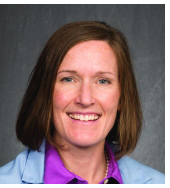On Being a Doctor and a Human in the Pandemic: Connection and Vulnerability

By Amy Blair
With each passing 24 hours, my roles of physician and physician educator and mother (and human of the planet Earth) have been taxed in complex ways. The problem-solving demands are intense and the solutions often feeble, weakened by uncertainty, if not paralyzed. It feels as if the rug were pulled out from under my stable pillar of work-life balance and I teeter and totter as the emails, announcements, protocols, and crash courses in new technologies try to blow me over each day. It is a new flavor of exhausting. A sympathetic overload (as in autonomic nervous system).
Of course, my patients are facing new challenges for which there is little precedent and for which they have few relevant experiences to draw on. They face many pressures such as a devastating loss of income from which the more privileged are insulated. Thus, they can underreact and indulge denial rather than think like the epidemiologists we would have them be.
For instance, I accompanied one of my patients as she tried to come to terms with her COVID19 positive test and the need for home quarantine. She asked me how she could return to work at a downtown office, needing the income. I explained the CDC guidelines which include quarantine for 7 days. Then she asked “…could I still do my (GrubHub) food delivery?“
Another woman in her 70’s with chronic respiratory and cardiac problems insisted on coming in for her physical with me despite feeling well overall. While I expressed my gratitude in seeing her, I suggested that she needed to start sheltering in place, getting her grandchildren to deliver things to her, and not leaving home, as she is high risk for complications from COVID19. She said, “But doctor, I have bowling tonight, and we’ve been doing so well. I think I’ll bowl just this one last time, think that’s okay?”
"I’m more in the moment. More present. More raw. Exhausted but exhilarated."
Despite my anxieties in this brave, new world, I have been surprised to find that when I am in front of patients in real life or via a screen, I truly see them and I feel unusually calm, incredibly normal. At times more normal than during patient care in “peace time”, less concerned about anything other than that moment. I’m more in the moment. More present. More raw. Exhausted but exhilarated.
I feel like a teammate with my patients in the same battle against such a clear common enemy. Maybe it’s because many of the patients that are getting sick are just like me – essential workers, having to leave their homes – we share something in common. I’m able to connect like never before at a very human level. I’ve told them I’m scared, I’m uncertain, but I’m with them. I’ve never told a patient that before, in this way. And I’ve never had so many tell me they are worried for me, and to take care of myself. (Although I’ve been reminded of when I was pregnant, and patients would tell me to slow down and care for myself, most of them grandmothers.) So, this connection makes me feel so present, fulfilled, and myself even when the connection is about accompaniment of them or their families in their loss.
One of my long-time patients, Blanca was a Latina woman in her 80’s whose body was riddled with pain from rheumatoid arthritis and COPD. In this fractured and weakened state, she died in an ICU surrounded by a heroic and caring team. But her daughter was not able to be there for her mother’s death because the no visitation policy prohibited her presence. When I called the daughter to express my condolences, she was frozen . . . could not process how this could come to pass, that after being her full-time mother’s caregiver for over 10 years, living each day to find comfort for her and advocate for her, that she couldn’t be present for the end, and now, could not be with her mother’s ashes nor have a funeral. I had no words, and could only listen.
It is odd that I am most at ease in these moments of community with these patients and their families. In fact, when I leave patient care, walking to my car brings the same sensation every time. The struggle for me is that I am happy when I’m doing my work, and enriched by my work. But when I leave, and drive home, and realize the world is so different, and could be so different for so long, I feel grief. A crushing sense of loss. A worry that the world will never be the same again. And when I arrive to my house, my kids at the door, standing six feet back asking if or when they can hug me, I am reminded how abnormal, how sad, this is.
And I worry I will never recover the “me” I was before, as the mixing of my identities comes crashing in.
Content originally published by Amy Blair on Reflective MedED Blog. Amy Blair, MD, is Associate Professor of Family Medicine and Medical Education and Assistant Dean of Educational Affairs at the Loyola University Chicago Stritch School of Medicine. She also directs the school’s Center for Community and Global Health.
